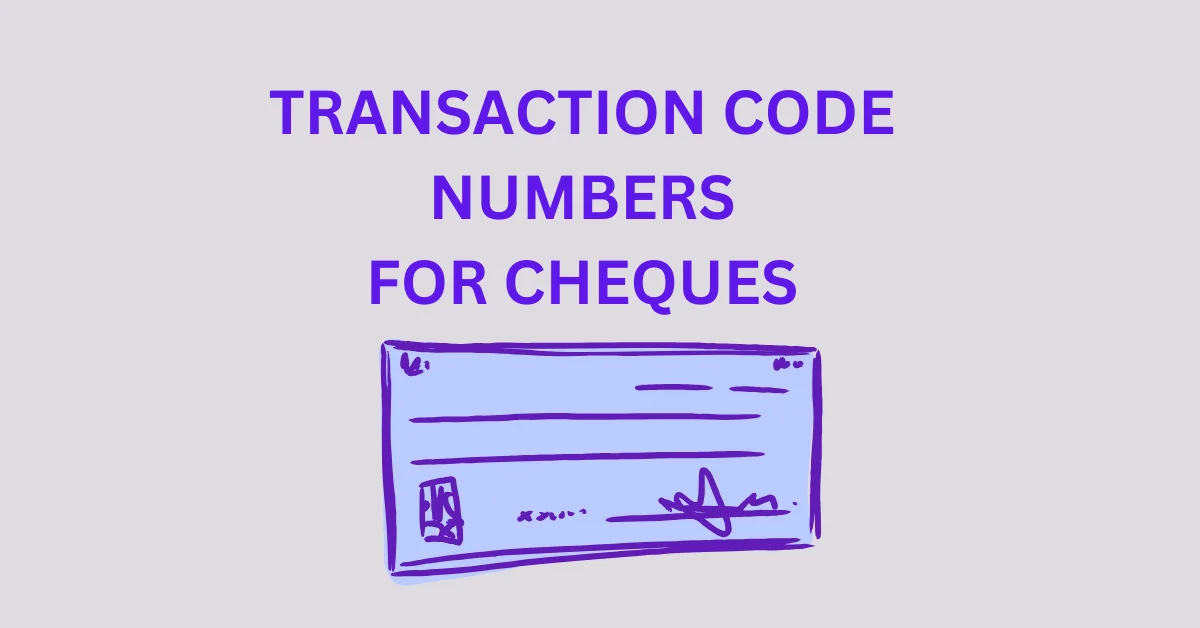In this article we provide the information related to the transaction code number in cheque. A standardized set of transaction codes has been established for universal application across all banks.
These codes, intended for pre-printing on cheques, consist of two-digit numbers ranging from 01 to 99. The allocation is such that codes 01 to 49 are designated for debit instruments, while codes 50 to 99 are reserved for credit instruments.
TRANSACTION CODE NUMBER IN CHEQUES
The following outlines the specific transaction code numbers and their corresponding nature of transactions or instruments:
| Transaction Code No. | Nature of Transaction / Instruments represented by the Code |
| 01-09 | Codes reserved for clearing house control documents representing debit instruments. |
| 10 | Savings Bank Account Cheque |
| 11 | Current Account cheque |
| 12 | Banker’s cheque |
| 13 | Cash credit account cheque |
| 14 | Dividend warrant |
| 15 | Traveller’s cheque |
| 16 | Demand Draft |
| 17 | Cheques which will be issued in lieu of existing payment order |
| 18 | Gift cheque |
| 19 | Interest warrant |
| 20 | State government transactions |
| 21 | Central Government transactions |
| 22 | Railway transactions |
| 23 | Posts & Telegraphs transactions |
| 24 | Defense transactions |
| 25 | Telecommunication transactions |
| 26 | Reserved |
| 27 | Departmentalised ministries (UMALO) transactions |
| 28 | Refund warrant |
| 29 | At Par Current Account Cheques |
| 30 | Stock Invest |
| 31-49 | Reserved |
01-09: Codes reserved for clearinghouse control documents representing debit instruments.
These codes are designated for documents related to clearinghouse control, specifically representing debit instruments. This ensures a systematic and organized process for clearing transactions.
10: Savings Bank Account Cheque
This code corresponds to cheques issued from savings bank accounts, catering to individuals who hold such accounts for personal savings.
11: Current Account Cheque
For transactions involving current accounts, this code is used. Current accounts are typically utilized by businesses and individuals for regular financial transactions.
12: Banker’s Cheque
Banker’s cheques, which are guaranteed by the issuing bank, are represented by this transaction code. They provide a secure form of payment.
13: Cash Credit Account Cheque
Cash credit accounts allow individuals or businesses to withdraw funds beyond their account balance. This transaction code is used for cheques associated with such accounts.
14: Dividend Warrant
Dividend warrants, which are documents that signify the payment of dividends to shareholders, are identified by this transaction code.
15: Traveller’s Cheque
For travellers’ convenience, this code is assigned to cheques specifically designed for use during travel. Traveller’s cheques are known for their security features.
16: Demand Draft
Demand drafts, often used for transferring money between banks, are represented by this transaction code. They provide a secure means of payment.
17: Cheques Issued in Lieu of Existing Payment Order
This code is used for cheques issued as an alternative to existing payment orders, offering flexibility in financial transactions.
18: Gift Cheque
Cheques issued as gifts are categorized under this transaction code. It allows for a formalized and traceable method of presenting gifts.
19: Interest Warrant
When interest payments are made, this transaction code is utilized. It provides clarity in identifying cheques related to interest disbursements.
20: State Government Transactions
For transactions involving state governments, this code ensures the proper categorization of cheques associated with state-level financial activities.
21: Central Government Transactions
Similar to state government transactions, this code is used for cheques related to financial dealings with the central government.
22: Railway Transactions
Specifically for transactions involving railways, this transaction code streamlines the identification of cheques associated with railway-related financial activities.
23: Posts & Telegraphs Transactions
Cheques related to transactions involving postal and telegraph services are represented by this code. It aids in the organized tracking of financial activities in these domains.
24: Defense Transactions
This code is utilized for transactions related to defense activities. It ensures a distinct categorization of cheques associated with defense-related financial matters.
25: Telecommunication Transactions
For transactions within the telecommunications sector, this transaction code helps identify and differentiate associated cheques.
26: Reserved
This code is reserved for specific use cases or emerging needs, providing flexibility for future developments in financial transactions.
27: Departmentalized Ministries (UMALO) Transactions
Transactions involving departmentalized ministries fall under this category. The code facilitates the efficient handling of financial activities related to ministries.
28: Refund Warrant
When refunds are processed, this transaction code is used to categorize cheques associated with the return of funds.
29: At Par Current Account Cheques
For current account transactions designated as “at par,” this code ensures a standardized identification process for these cheques.
30: Stock Invest
This transaction code is associated with stock investments, providing clarity on cheques related to stock market activities.
31-49: Reserved
A range of codes is reserved for future use, allowing for adaptability to evolving financial needs and emerging transaction types.
Note: Currently, banks have decided to exclude travellers’ cheques from the scope of mechanized cheque processing. Travellers cheques may not be printed in MICR format and with a MICR codeline.
Consequently, when the regular mechanized cheque processing system is implemented for cheque clearing, travellers’ cheques will not be eligible for presentation through the clearing system.
